Careers and Internships
MCLA graduates are well prepared for meaningful careers in research, government, politics, education, business, and law, where their skills in analysis, problem-solving, and environmental stewardship are in high demand.
Recent Graduate Profiles
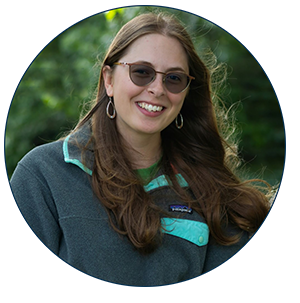 A teacher naturalist for Mass Audubon. In this role, she engages with the community
and teaches environmental education in Fall River and New Bedford, Massachusetts.
A teacher naturalist for Mass Audubon. In this role, she engages with the community
and teaches environmental education in Fall River and New Bedford, Massachusetts.
“I get to do deep-impact, series-based programs in schools and community organizations for youth in grades K-12,” Abby said. “I also facilitate my region’s cohort of Mass Audubon’s Youth Climate Leadership Program for high school students. I’m really grateful that I get to be a part of this work, because it’s something I’m super passionate about!
“When I first transferred to MCLA, I felt torn about choosing a major because I wanted to study both Sociology and Environmental Studies, but thought I could only do one. My advisors were very supportive and encouraged me to double major. Their support throughout my time at MCLA was super impactful to me because they worked together to help me follow an academic path that matched my passions.
“This led me to take courses like Children’s Geographies, Environmental Anthropology, Environmental Economics, and Environmental Justice, which all deepened my understanding of the intersections of social and environmental issues. In my work at Mass Audubon, I lean into these lessons every day as I work with communities to further goals like increasing access to nature and teaching environmental education, which ultimately benefit both people and wildlife.
“The community at MCLA was always a highlight for me! I transferred to MCLA mid-pandemic, in Fall 2020, which was a scary and isolating time. I joined Outdoors Club that year because I was hoping to find community and explore the nature of the Berkshires. Not only did I meet many incredible people who became wonderful friends, but I also met Joseph Doyle, the Outdoors Club president, and we fell in love. We're building a life together now, and I am so grateful that we met.”
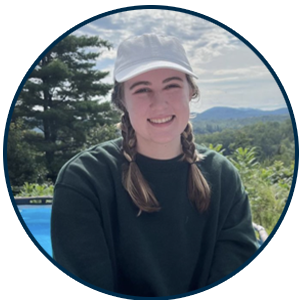 On the afternoon of September 19th, the Environmental Science department’s Entering
Student Seminar course, taught by Daniel Shustack — Professor of Environmental Science,
met in CSI for pizza and a stimulating seminar titled “Life After College: Environmental
Science” given by MCLA alumni, Shannon Welch ’22. Throughout the semester, various
speakers visit the class to give seminars about life in Environmental Science to help
prepare and guide them as they integrate their studies into their everyday lives.
For Welch, she structured her presentation around what she thought would be most useful
for the students, and as it turned out, Welch’s advice can span across many different
fields of study.
On the afternoon of September 19th, the Environmental Science department’s Entering
Student Seminar course, taught by Daniel Shustack — Professor of Environmental Science,
met in CSI for pizza and a stimulating seminar titled “Life After College: Environmental
Science” given by MCLA alumni, Shannon Welch ’22. Throughout the semester, various
speakers visit the class to give seminars about life in Environmental Science to help
prepare and guide them as they integrate their studies into their everyday lives.
For Welch, she structured her presentation around what she thought would be most useful
for the students, and as it turned out, Welch’s advice can span across many different
fields of study.
Welch began with what she considered to be three of the most important questions when
it comes to employment after college:
Do you want to stay in this area of work?
How do you feel about field work?
What relationship do you want to have with your job?
“Figuring out what you love and don’t love in your field of work is so important to narrowing down what you want to do,” said Welch. “Try things out, take advantage of different opportunities and see what works for you.”
She also emphasized that there is no judgment on your answers to those questions and the path that is right for you, “Yeah, field work [in Environmental Science] is fun, but if you hate doing it in the rain then maybe don’t follow a path that leads you to be outside 24/7, and that’s okay!” Welch also acknowledged that it can be scary to “strike out on your own”and that not having a college community supporting you can be hard in your first few months post-graduation. Her remedy for that is simple: “I would say that the biggest thing you’ll have to do is learn to trust yourself and your knowledge. And also learn the value of hobbies, you’re going to have a lot more time on your hands!” she said. When it comes to steps students should be taking to further prep themselves for life after college, Welch says, “Start networking! Not only with people in town but with your advisor and professors, too! Share your excitement about your future! Talk to them about your interests in the field, listen to them talk about theirs! And also take advantage of internships, every semester is an opportunity to do something new and cool!”
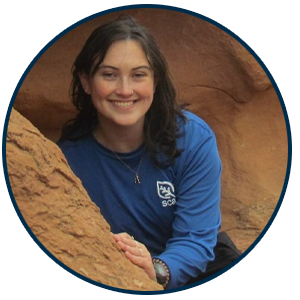 After graduating MCLA I completed two internships with the Student Conservation Association
in Montana and Utah, before accepting a permanent position as a park ranger with the
National Park Service. I give educational programs, conduct tours, work with school
groups, assist with search and rescue, and staff visitor centers. I have become a
historic weapons supervisor, and conducted cannon demonstrations, provided night sky
astronomy programs for hundreds of visitors, and gotten to live and work in some of
the most beautiful places in the country. I have worked for both the NPS and the
United States Forest Service, and feel my degree in Environmental Studies and minor
in Political Science have prepared me to handle the often complex dynamics of doing
environmental work for the Federal Government. I couldn't love my job more, but it
was fairly difficult to break into a career with the Park Service, due to such a high
demand for jobs. I wouldn't trade my college experience at MCLA for anything, and
am very grateful for the courses, friends, and staff that have helped me in finding
my dream career.
After graduating MCLA I completed two internships with the Student Conservation Association
in Montana and Utah, before accepting a permanent position as a park ranger with the
National Park Service. I give educational programs, conduct tours, work with school
groups, assist with search and rescue, and staff visitor centers. I have become a
historic weapons supervisor, and conducted cannon demonstrations, provided night sky
astronomy programs for hundreds of visitors, and gotten to live and work in some of
the most beautiful places in the country. I have worked for both the NPS and the
United States Forest Service, and feel my degree in Environmental Studies and minor
in Political Science have prepared me to handle the often complex dynamics of doing
environmental work for the Federal Government. I couldn't love my job more, but it
was fairly difficult to break into a career with the Park Service, due to such a high
demand for jobs. I wouldn't trade my college experience at MCLA for anything, and
am very grateful for the courses, friends, and staff that have helped me in finding
my dream career.
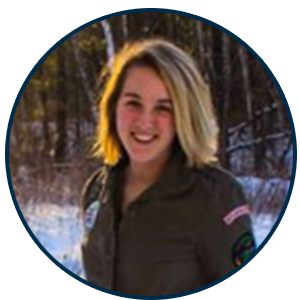 Interdisciplinary studies major Kaitlin Gevry ’19 of Dudley, Mass., has loved the
outdoors since she was a child. In addition to an aunt who taught her about flora
and fauna, her parents are scuba divers who fostered her love of swimming, and instilled
in Gevry a respect for marine life. Part of a travel study course that recently culminated
in a trip to South Florida and the Everglades, Gevry had the opportunity to study
some of the region’s wildlife, including Florida manatees. These animals are some
of the most threatened in this country’s waters, due to collisions with watercraft,
the destruction of their habitat, and competition for resources. “It was remarkable
to see the manatees less than a few feet away from us,” she said. While snorkeling
in the Florida Keys, several students – including Gevry – noticed a nurse shark, whose
population also is declining. “Sharks are essential to the ocean ecosystem by keeping
the marine food chain in balance. Someday, I hope to be able to dive with a great
white and a whale shark. I would be ecstatic to have a job collecting shark and or
marine life data, while working to promote their conservation efforts,” Gevry said.
Originally, Gevry wanted to major in education. Now she aims to work as a game warden
or a park ranger. “I took a course pertaining to the environment and human impacts,”
she explained. “From there, I became interested in environmental studies. An interdisciplinary
career working with natural resources and people would be the perfect fit.” Becoming
a Trailblazer, Gevry explained, has allowed her to assume leadership roles and participate
in extracurricular activities: she served as the vice president of ski club and as
a student athlete in cross country. “Being part of a college that offers various teams
and organizations has definitely made my undergraduate experience rewarding,” she
said.
Interdisciplinary studies major Kaitlin Gevry ’19 of Dudley, Mass., has loved the
outdoors since she was a child. In addition to an aunt who taught her about flora
and fauna, her parents are scuba divers who fostered her love of swimming, and instilled
in Gevry a respect for marine life. Part of a travel study course that recently culminated
in a trip to South Florida and the Everglades, Gevry had the opportunity to study
some of the region’s wildlife, including Florida manatees. These animals are some
of the most threatened in this country’s waters, due to collisions with watercraft,
the destruction of their habitat, and competition for resources. “It was remarkable
to see the manatees less than a few feet away from us,” she said. While snorkeling
in the Florida Keys, several students – including Gevry – noticed a nurse shark, whose
population also is declining. “Sharks are essential to the ocean ecosystem by keeping
the marine food chain in balance. Someday, I hope to be able to dive with a great
white and a whale shark. I would be ecstatic to have a job collecting shark and or
marine life data, while working to promote their conservation efforts,” Gevry said.
Originally, Gevry wanted to major in education. Now she aims to work as a game warden
or a park ranger. “I took a course pertaining to the environment and human impacts,”
she explained. “From there, I became interested in environmental studies. An interdisciplinary
career working with natural resources and people would be the perfect fit.” Becoming
a Trailblazer, Gevry explained, has allowed her to assume leadership roles and participate
in extracurricular activities: she served as the vice president of ski club and as
a student athlete in cross country. “Being part of a college that offers various teams
and organizations has definitely made my undergraduate experience rewarding,” she
said.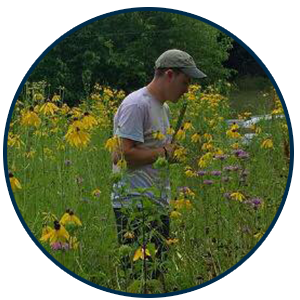 During my time at MCLA I completed two internships with local conservation-based nonprofits,
worked with Dr. Eric Doucette on plant systematics research, and worked as a field
and lab technician for an urban landscape ecology lab at The Ohio State University.
These experiences, along with my classes, were essential for my experience as an undergraduate
student. After graduating from the Environmental Studies program with a minor in Biology
from MCLA, I was accepted into a Masters of Biological Sciences program at Wright
State University in Dayton, Ohio. At Wright State, I work in a lab that is focused
on plant-insect interactions, specifically the interactions between emerald ash borer
and it’s host trees. For my thesis, I will be analyzing the physiological defense
mechanisms of a novel host, white fringetree, and comparing them to black ash, a known
host of emerald ash borer. The goal of this research is to elucidate information about
white fringetree defense, while also adding to the growing body of knowledge regarding
the responses of hardwood tree species to insect pests.
During my time at MCLA I completed two internships with local conservation-based nonprofits,
worked with Dr. Eric Doucette on plant systematics research, and worked as a field
and lab technician for an urban landscape ecology lab at The Ohio State University.
These experiences, along with my classes, were essential for my experience as an undergraduate
student. After graduating from the Environmental Studies program with a minor in Biology
from MCLA, I was accepted into a Masters of Biological Sciences program at Wright
State University in Dayton, Ohio. At Wright State, I work in a lab that is focused
on plant-insect interactions, specifically the interactions between emerald ash borer
and it’s host trees. For my thesis, I will be analyzing the physiological defense
mechanisms of a novel host, white fringetree, and comparing them to black ash, a known
host of emerald ash borer. The goal of this research is to elucidate information about
white fringetree defense, while also adding to the growing body of knowledge regarding
the responses of hardwood tree species to insect pests.
